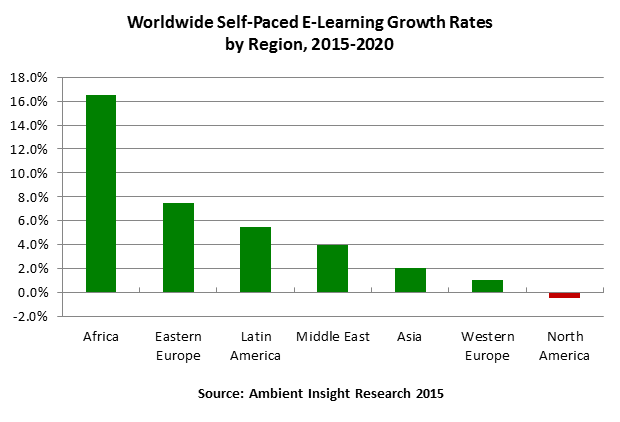
Where is all the Professional Talent in Latin America?
Latin America leads the world in talent shortages, and that the problem is getting worse
This post is also available in: Spanish
This article was originally written for IQ Latino, which has given the Inter-American Dialogue permission to reproduce the text on PREAL Blog. To read the original article, click here.
This article is based on a recent report by the Organization for the Economic Co-operation and Development (OECD), which analyzes the incorporation of information and communications technologies (ICTs) into Latin American higher education. The main focus of the report is the e-learning model, a type of virtual, distance education disseminated through electronic channels (especially the Internet) that utilizes digital tools or applications as support for teaching and learning processes. The OECD defines e-learning as “the use of ICT to enhance and/or support learning in tertiary education.”
The report is based on 34 university surveys, carried out in 15 Latin American countries, and interviews to six regional education experts. This article offers a general view of the e-learning model and outlines the main survey results, the points of consensus among the experts, and some policy recommendations from the research.
The e-learning model has become increasingly attractive and relevant in the higher education field. Its expansion is due not only to the emergence of new technologies and the development of new pedagogical methods, but also to the need to expand access to higher education and find additional financial resources that ensure the sustainability of the tertiary system. In this sense, e-learning is seen not only as a way to offer education, but also as a medium through which students can learn how to use new technologies in a context where digital literacy is becoming ever more important.
In recent years, the e-learning model has grown steadily as a higher education option and is expected to continue expanding across the globe. According to Ambient Insight Research, the worldwide market for “self-paced e-learning” reached US$46.9 billion in 2015, a significant increase from the US$32.1 billion generated in 2010.
According to recent projections, e-learning will continue its expansion in developing countries. It is expected that during the 2015-2020 period, e-learning use will increase by 16.5% in Africa, 7.5% in Eastern Europe, 5.5% in Latin America, 4% in the Middle East, and 2% in Asia. In Western Europe and North America, it is expected to expand by 1% and -0.5%, respectively. The 20 countries where e-learning use is expected to increase the most include three Latin American countries: Dominican Republic with 36% (#11), Honduras with 34% (#14), and El Salvador with 32% (#18).

In this context, Massive Open Online Courses (MOOCs) have especially set themselves apart as effective forms of e-learning. As the article “The Consolidation of Digital Education” (in Spanish) explains, MOOCs emerged in 2008, but their expansion and massive popularity did not take place until early 2012, when three large platforms were founded: Udacity, Coursera, and EdX. These and other platforms are complemented by the Khan Academy, another actor that has revolutionized virtual education in the last decade (although mainly in secondary education).
In recent years, several countries in Latin America have adopted MOOCs on a larger scale. Mexico and Brazil are two of the 10 countries that use MOOCs the most worldwide. The main MOOC platform in Spanish, MiriadaX, launched in 2013 by Red Universia and Telefónica Educación Digital, provides more than 1.232 universities in 23 Latin American countries with the possibility of offering free MOOCs. Another example is Veduca in Brazil, which offers more than 300 free online courses in 21 knowledge areas. Moreover, some regional organizations have begun to promote the use of MOOCs in Latin America. For instance, the Inter-American Development Bank, in partnership with EdX, created the IDBx platform to offer online courses focused on economic and social development.
The OECD report produced the following results with regards to e-learning in Latin America:
Beyond these results, the interviews conducted with Latin American experts made it clear that there is consensus on a few key issues. First, the incorporation of ICTs into education systems in the region remains low and has primarily focused on improving administrative processes rather than pedagogical methods. Second, many higher education institutions have been reluctant to incorporate e-learning into their schools, even though technology offers the opportunity to experiment with new teaching and learning models. Third, e-learning programs have the potential to help overcome common challenges such as improving access and connecting the education system to labor market demands. Lastly, education policies can have a significant impact on the adoption of new technologies in education.
The report outlines three areas that governments should look into and act on in the next few years from a public policy perspective:
In conclusion, the e-learning model offers a new way of designing and implementing higher education. Latin America has shown certain rigidity towards generating large-scale changes in the public sector. This happens particularly in the education sector, where investments tend to have medium and long-term results. Nevertheless, with the growing access to technological equipment and connectivity, as well as the progressive demand for market-relevant skills and competencies, innovation in education models is a logical step. Policymakers and other regional leaders must see the expansion of the e-learning model as an opportunity to democratize education and strengthen human capital, rather than as a threat to the status quo, which currently does not yield the desired results.
Main sources:
OECD (2015). E-Learning in Higher Education in Latin America, Development Centre Studies, OECD Publishing, Paris, France.
Ambient Insight Research (2016). “The 2015-2020 Worldwide Self-paced eLearning Market: Premium Edition”.
Telefonica Foundation & Ariel (2015). MOOCs in the Education of the Future: Digitizing Training. Madrid, Spain.
Latin America leads the world in talent shortages, and that the problem is getting worse
An analysis of global trends and their impact on education policies in Chile.
Online competency-based education is attempting to create a sea change in education, largely for underserved or unserved populations of students.

